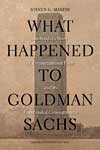A biography of the vampire squid
Book review: What Happened to Goldman Sachs, by Steven MandisSteven Mandis' book on Goldman Sachs may be accessible, but it's also wholly inadequate.

Get the latest financial news, insights and expert analysis from our award-winning MoneyWeek team, to help you understand what really matters when it comes to your finances.
You are now subscribed
Your newsletter sign-up was successful
Want to add more newsletters?

Harvard Business Press Books (£18.99)
There is no bank more notorious than Goldman Sachs. For many, it is the prime example of a greedy, self-obsessed institution that will stop at nothing to make money. So there is a large public appetite for books on the controversial firm. However, last year's memoir by ex-trader Greg Smith was universally panned for focusing on personal anecdotes and lacking substance. What Happened to Goldman Sachs: An Insider's Story of Organizational Drift and its Unintended Consequences, by former partner Steve Mandis, attempts to provide a more sober analysis.
Try 6 free issues of MoneyWeek today
Get unparalleled financial insight, analysis and expert opinion you can profit from.

Sign up to Money Morning
Don't miss the latest investment and personal finances news, market analysis, plus money-saving tips with our free twice-daily newsletter
Don't miss the latest investment and personal finances news, market analysis, plus money-saving tips with our free twice-daily newsletter
Based on his PhD thesis for Columbia University, notes the FT's Tom Braithwaite, it looks at Goldman's transition "from partnership to public company and always-trusted adviser to often amoral traders". It uses interviews with "over 50" people, including "partners, clients, competitors, equity research analysts, investors, regulators and legal experts". However, the author "includes little of his own time at Goldman" from 1992 to 2004.
Mandis argues that, as a partnership, "Goldman de-emphasised the profit motive to give its employees a sense of higher purpose and to burnish that brand", says Mary Kissel in The Wall Street Journal. However, in 1999 the end of the separation between investment and commercial banking led to "consolidation that gave other Wall Street firms bigger balance sheets to compete for Goldman's clients" and best employees. It had to go public, forcing it to "balance the interests of investors and shareholders with those of its clients". Stricter regulation also pushed Goldman "away from its business principles and toward the management of legal liability".
But the book's conclusion about the superiority of partnerships over listed firms is "the same as all the rest", making it "wholly inadequate", says David Bahnsen of blog The Bahnsen Viewpoint. Mandis doesn't give enough detail about Goldman's misdeeds, merely presupposing "some bad did take place". We're left waiting for a book that asks whether "anything has gone wrong at Goldman" and if the media and regulators' response was "proportionate".
Actually, this is an "accessible" book that includes a timeline and biographies of its leaders, says Peter Lattman of The New York Times Dealbreaker blog. Anyone who thinks the bank unfairly criticised should look at the book's "list of Goldman partners at the time of its initial public offering and the value of their stock holdings after the first day of trading".
What Happened to Goldman Sachs: An Insider's Story of Organizational Drift and its Unintended Consequences, by Steven Mandis, is published by Harvard Business Press Books (£18.99).(Buy from Amazon.co.uk)
Get the latest financial news, insights and expert analysis from our award-winning MoneyWeek team, to help you understand what really matters when it comes to your finances.

-
 Student loans debate: should you fund your child through university?
Student loans debate: should you fund your child through university?Graduates are complaining about their levels of student debt so should wealthy parents be helping them avoid student loans?
-
 Review: Pierre & Vacances – affordable luxury in iconic Flaine
Review: Pierre & Vacances – affordable luxury in iconic FlaineSnow-sure and steeped in rich architectural heritage, Flaine is a unique ski resort which offers something for all of the family.
